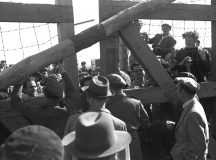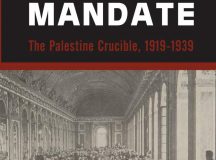James Vaughan is Lecturer in International History at the University of Aberystwyth. His current research focuses upon the changing attitudes and policies of Britain’s major political parties to Zionism, Israel, Palestinian nationalism and the Arab-Israel conflict. In this essay he traces the long and fascinating history of conflicting attitudes towards Zionism and Israel in the British Conservative party, from Balfour to Boris.
Shortly before the Conservative Party’s annual conference in October 2021, Boris Johnson contributed a message of introduction to the 2021/2022 edition of Informed magazine, the keynote publication of Conservative Friends of Israel (CFI). In it, Johnson declared that
The Conservative Party stands firmly with our friends in Israel, and I am proud that under this government the relationship between the UK and Israel continues to go from strength to strength … Under this government, the UK’s support for Israel’s security will be unflinching, and we will always back Israel’s right to self-defence.
This message was echoed a few days later by Johnson’s newly appointed Foreign Secretary, Liz Truss, who told a Conference CFI reception of her determination to develop a ‘deeper relationship with Israel’, stating that the UK had ‘no closer friend and ally’.
Johnson and Truss’s pronouncements fitted seamlessly into a tradition of public support for Israel that had been clearly articulated by their immediate predecessors as 21st century British Conservative Prime Ministers. Theresa May, speaking at the official dinner to commemorate the centenary of the Balfour Declaration, was particularly forthright in brushing off criticisms of the Balfour legacy. ‘When some people suggest we should apologise for this letter’, she declared, ‘I say absolutely not. We are proud of our pioneering role in the creation of the State of Israel. We are proud to stand here today together with Prime Minister Netanyahu and declare our support for Israel. And we are proud of the relationship we have built with Israel. And as we mark one hundred years since Balfour, we look forward to taking that relationship even further.’
Three years earlier, on a March 2014 visit to Israel, David Cameron identified himself to the members of the Israeli Knesset as ‘a British Prime Minister whose belief in Israel is unbreakable and whose commitment to Israel’s security will always be rock solid.’ Like May, Cameron was at pains to refer to the 1917 Balfour Declaration and to the ‘the proud and vital role’ that Britain had played ‘in helping to secure Israel as a homeland for the Jewish people.’
May and Cameron’s emphasis on the 1917 Balfour Declaration was evidently a product of their proximity to the Declaration’s 2017 centenary, but it also spoke to deeper-rooted historical traditions of Conservative Party support for Israel. The somewhat mythologised figures of Balfour and Churchill naturally stand very much at the heart of historical perceptions of Conservative pro-Zionism. Famously, and much to the chagrin of the Foreign Office at the time, Churchill set out his post-war views on the matter in May 1953. ‘Ever since the Balfour Declaration’, he told the House of Commons, ‘I have been a faithful supporter of the Zionist cause,’ before going on to express the hope that ‘the Arab States will come to peace with Israel, and … that the great Zionist conception of a home for this historic people, where they live on the land of their ancestors, may eventually receive its full fruition.’
Yet the story of Conservative Party attitudes towards Zionism and Israel is by no means as straightforward or untroubled as the pathway from Balfour to Churchill, and Churchill to Johnson would suggest. At numerous points in the twentieth century, Zionist sympathisers were very far from representing mainstream opinion in the Party. As one scholar of the mid-twentieth century Conservative Party put it, ‘Despite Churchill’s known sympathy, and Balfour’s much earlier, the Conservative Party generally stood aloof, at the very least, from Zionism. Moreover the Conservative party contained some members with records of hostility to Zionist aspirations, and a few previously regarded as hostile to Jews in general.’[1]
Even Balfour and Churchill are vulnerable to criticisms of this kind, at least at certain moments in their careers. In 1914, Balfour admitted to Chaim Weizmann that he shared many of Cosima Wagner’s antisemitic viewpoints, something that the Israeli historian, Shmuel Almog has determined to be ‘no easy matter’, revealing as it does perhaps the central figure in British policy towards Zionism associating himself with ‘the connecting link between the antisemitism of the deceased composer and the future Nazi movement.’[2] Churchill also flirted with the conspiratorial antisemitism of the radical right, publishing a notorious article in early 1920 (at a time when, it should be noted, he was still a leading member of the Liberal Party) which, in describing the battle between Zionism and Bolshevism as a ‘struggle for the soul of the Jewish people’, railed against those ‘international Jews’ who sought to establish a ‘world-wide communistic state under Jewish domination.’ One result of that was an attack in the pages of the Jewish Chronicle, which in its edition of 13 February 1920, denounced Churchill as a Cabinet Minister lending ‘the weight of his authority to a legend which has martyred the Jews by the thousand.’
Ultimately, these moments proved to be unrepresentative of both Balfour and Churchill’s political evolution and their longer-term careers. Nevertheless, they speak to the existence of a set of political tendencies within British Conservatism that regularly manifested themselves in the form of anti-Zionist and sometimes antisemitic politics. Those tendencies are, I think, worthy of investigation and acknowledgement, if only to place the contemporary Conservative Party’s current enthusiasm for Israel into its proper historical context.
In an era when anti-Zionism has become an established ‘poster issue’ for the British left – reaching new levels of antagonistic intensity in the era of Jeremy Corbyn’s Labour Party leadership – it is easily forgotten that the foundations of an anti-Zionist reaction to the Balfour Declaration were laid by the right-wing of the Conservative Party. If that assault on Zionism sometimes took the form of rather facetious provocation – ‘Since when has Palestine become a new home for the Jews and is not this a great blow to Brighton?’ Colonel Claude Lowther (a prominent figure in the Anti-Socialist Union) asked his fellow MPs in the House of Commons on 2 December 1920 – it also manifested itself in harsher and more worrying forms. The so-called ‘Die Hards’, who combined a fierce anti-Bolshevism with xenophobic nationalism and a belief in the existence of a Jewish conspiracy to subvert the British Empire, were never likely to smile on the Balfour Declaration and its pledge to establish a national home for the Jews in what, by the summer of 1922, had been formally established as the British Mandate for Palestine.
The inter-war years, therefore, represented an intriguing period where Conservative Party Zionists (Churchill, Leopold Amery, Victor Cazalet and Robert Boothby prominent amongst them) were overshadowed and outmuscled by a dedicated cadre of anti-Zionist activists backed by the populist right-wing press. If, initially, that Conservative attack on Zionism could be explained as part of more general right wing assault on Lloyd George’s coalition government, it soon took on more determined and specific campaigning attributes and swiftly became connected both to Palestinian Arab leaders and some sinister figures on the extreme right of British politics.
As Weizmann noted in his memoirs, one of the first important Palestinian Arab delegations to travel to London in 1921, came to serve as ‘a rallying point for elements which we should now describe as “reactionary” or “fascist,” but which we then spoke of as “the diehards”.’ Under the leadership of William Joynson-Hicks in the House of Commons, and Lords Islington, Sydenham and Raglan in the upper house, the Palestine question was increasingly popularised as one where ‘Jews rode roughshod over “the poor Arabs” and charged the British taxpayer several shillings in the pound for doing it.’ The Beaverbrook press, and the Daily Express in particular, was especially enthusiastic in its efforts to develop the line that ‘the ordinary British taxpayer was being heavily mulcted in order to enable a few East European Jews to oppress and expropriate the Palestine Arabs.’[3] The Daily Express was not above resorting to overtly antisemitic formulations in its anti-Zionist campaigns, depicting Weizmann as ‘the most wonderful of the mystery men’ who possessed ‘a genius for exerting a hidden mastery over the minds of our simple British politicians.’[4]
In the House of Commons, the chief bête noire of the British Jewish community, and a politician promoted by Stanley Baldwin to Cabinet rank to serve as Home Secretary from 1924-1929, was William Joynson-Hicks. Joynson-Hicks seemingly delighted in the kind of Jew-baiting more normally associated with central European politicians of this period and, as David Cesarani has noted, the epithet ‘antisemite’ trailed from Joynson-Hicks’ coat tails throughout his career. Cesarani concluded that this was a reputation that did his career no harm at all, adding the supposition that his antisemitism ‘actually made him the kind of representative figure which Baldwin understood would enhance rather than detract from, first, his electoral team, and second, his government.’[5]
In the House of Lords, figures like Lord Sydenham pioneered a reactionary anti-Zionism that fitted neatly with the emerging politics of Britain’s proto-fascist right. Sydenham adopted the Duke of Northumberland’s far-right journal, The Patriot, to develop an analysis of Zionism based on the conspiratorial idea that Jewish immigrants into Palestine were agents of ‘Jewish finance’ who could be expected ‘not only to enslave Palestine economically but also to use it as their springboard on the world.’ This case against Zionism might have sought to justify itself as a defence of British imperial interests but, as Markku Ruotsila argues convincingly, the incoherence of the journal’s strategic analysis suggests that its statements on Palestine should more properly be regarded as ‘utterances of intrinsic prejudice against Jews than as considered geo-political or economic positions.’[6] It is especially noteworthy that the antisemitism of figures like Sydenham had developed in very different directions to that which had been anticipated by Liberal Anglo-Jewish anti-Zionists like Edwin Montagu. Montagu had famously feared that the Balfour Declaration would foster a pro-Zionist antisemitism that advocated the forced emigration of British Jews to Palestine. In fact, what transpired on the British right was very different. The belief that a Zionist Palestine would be a Bolshevik Palestine fostered an anti-Zionism on the part of Conservative antisemites who ‘did not want Jews to go to Palestine lest they made that area a centre for undermining British rule elsewhere.’[7]
Unsurprisingly, this kind of politics brought Conservative anti-Zionists into sinister company. Joynson-Hicks cooperated closely with an organisation called the National League, which, though established in 1912 as part of the women’s suffrage movement had, by the 1930s, degenerated into a right-wing anti-Zionist pressure group. The League’s President, Margaret Milne Farquharson, had direct links to fascists like Robert-Gordon-Canning, Oswald Mosley’s best man, whose 1938 pamphlet Arab and Jew declared unambiguously that ‘The British Union pities the Jew for the universal dislike he inspires throughout his history, but the cry of “persecution” comes too glibly from the mouths of those who by their money power have long persecuted Christendom. The Jewish problem cannot be settled in Palestine; it will be but another outbreak of the universal disease.’[8]
All this tends to reinforce the delicately understated conclusion of that eminent historian of British Conservatism, Robert Rhodes James, that ‘It had not been particularly easy for a Conservative MP in the 1930s to support Zionism and the Jewish National Home.’[9] It should not surprise us therefore that it should have been a Conservative government which dealt Anglo-Zionism one of its bitterest blows in the form of the 1939 Palestine White Paper. Neville Chamberlain, insofar as he was regarded as having any discernibly strong views pertaining to Zionism and Palestine, was not regarded as especially hostile. In 1931, at the time of Ramsay MacDonald’s reversal of Sidney Webb’s anti-Zionist White Paper, Chamberlain had assured his Jewish constituents in the Birmingham Zionist Council regarding his approach to the Palestine question: ‘I see no reason,’ he stated, ‘for changing the views I have always held in favour of the implementation of the Balfour Declaration in respect of the establishment of a Jewish National Home in Palestine.’[10] During the 1935 General Election, Chamberlain again stressed that a Conservative Government would continue to carry out the Mandate for Palestine, including the pledges set out in the Balfour Declaration, in both letter and spirit.
The outbreak of the 1936-39 Arab Revolt changed everything. Palestine was now a costly security issue that fed into the wider set of strategic dilemmas driving the policy of appeasement. Thus, in May 1939, Chamberlain’s government proposed a new White Paper which effectively repudiated the Balfour Declaration. It declared that Palestine would become an independent state within 10 years, imposed strict limits on Jewish immigration (which was to be made dependent on Arab consent), and declared that Palestine would become an independent Arab state incorporating a minority Jewish population. It was in vain, at least in the short term, that Churchill denounced the White Paper as ‘a surrender to Arab violence’ and Leo Amery called it ‘an act of appeasement in the worst Munich tradition.’ While the 1939 White Paper effectively closed off Palestine as a destination for Jews seeking to escape Nazi persecution and the Holocaust, it took the Manchester Guardian to point out what, with the benefit of hindsight now seems obvious. ‘The Government plan,’ it declared with foreboding, ‘puts the Jews under a more immediate and deadly fear than the Arabs have ever known.’[11]
In the post-war era, Anthony Eden remains a fascinatingly symbolic figure in the history of the post-war Conservative Party’s interactions with Israel and the Middle East. His transformation, from archetypal Foreign Office ‘Arabist’ to the first patron of the Conservative Friends of Israel group, was no doubt influenced by his clash with Nasser and Arab radicalism. As Prime Minister, however, and despite the underhand Anglo-Israeli military alliance forged at Suez in 1956, it is difficult to detect signs of any lasting flowering of UK-Israeli relations under the 1951-64 Conservative governments. If Harold Macmillan made some progress in that direction, the allegation levelled by one senior diplomat – that British diplomacy was in this period characterised by ‘sucking up to the Israelis when we need them and dropping them as soon as the need is over’ – is not entirely without foundation.
This was a tendency of Conservative Party diplomacy that re-emerged with some force during Edward Heath’s premiership in the 1970s. Heath’s government had been moving in pro-Arab directions; Sir Alec Douglas Home’s 1970 ‘Harrogate speech’, which stated that Britain could no longer ‘ignore the political aspirations of the Palestinian Arabs’ was certainly evidence of that. Nevertheless, the government’s policy following the outbreak of the October 1973 Arab-Israeli War still came as a shock to many. Heath and Home’s refusal to deliver arms to Israel during the 1973 war was presented as an act of neutrality, but Parliamentary opposition quickly emerged on both government and opposition benches. John Gorst, the Conservative MP for Hendon North, memorably accused Heath of bowing down ‘to the oily blackmail of the Arab States’. The future Labour Party Foreign Secretary, David Owen, articulated the anger of those Labour MPs who regarded the Conservative government’s policy as an act of betrayal:
I was appalled when the Foreign Secretary, Lord Home, and Prime Minister, Edward Heath, refused to supply, during the actual fighting, shells for the Centurion tanks that Israel had bought from us. I considered it then, and still do, the most cynical act of British foreign policy since Suez. It showed not just Arab influence within the Foreign Office but a total lack of principle in standing by one’s commitments from two politicians whom I had hitherto respected…. British influence with Israel never recovered, for perfectly understandable reasons…. It was a craven act which had everything to do with the threat of being cut off from Arab oil and for which I had nothing but contempt.’[12]
Such issues continued to complicate Anglo-Israeli relations under Margaret Thatcher. The prominence of pro-Arab diplomats like Carrington and Gilmour raised Israeli hackles during Thatcher’s first term, as did her endorsement of the EEC’s 1980 Venice Declaration, which, eight years before the PLO formally endorsed a two-state solution and renounced terrorism, sought to involve the PLO in peace negotiations and denounced Israeli settlements as an ‘obstacle to peace’ and ‘illegal under international law’. Thatcher also struggled to empathise with Israeli leaders like Menachem Begin, whose intransigence and insistence on thinking in terms of biblical Israel she dismissed as ‘illogical’. Relations with Begin’s government deteriorated enough during Thatcher’s first term for senior officials to seriously consider an attempt to shape the outcome of the 1981 Israeli General Election, with Foreign Office staff in Tel Aviv instructed to consider ways that they might successfully ‘put a spoke in Begin’s wheel.’[13]
Nevertheless, Thatcher can still be viewed as a chief architect of today’s friendship between Israel and the Conservative Party. Her personal sympathies had developed partly as a result of her admiration for what she perceived to be ‘Jewish’ values that placed an emphasis on self-help and personal responsibility and partly as an political reaction (simultaneously principled and opportunistic) against the Labour Left’s adoption of a strident anti-Zionism in the 1970s. Her support for Israel was bolstered by a Cold War perspective that led her to conclude that, should the Western position in the Gulf deteriorate, Israeli would be the only state in the region which would stand up and fight against the extension of Communist influence. If these pro-Israel instincts did not immediately prevail over her Foreign Office advisers (and she was too shrewd a protector of British interests to sacrifice business in the Gulf upon the altar of Israeli-Palestinian politics), her approach to Israel, not least in becoming the first serving Prime Minister to visit the country in 1986, laid the foundations for the vastly improved UK-Israeli relations of the 1990s and 2000s.
Yet if Thatcher was largely responsible for bringing pro-Israeli positions into the mainstream of Conservative Party policy towards Israel, the anti-Zionist tradition, though marginalised, has not entirely dissipated. In the mid-1970s, Thatcher’s Shadow Foreign Secretary, Reginald Maudling, created waves with his public support for a policy of recognising the PLO and the establishment of what he called, with deliberate diplomatic ambiguity, ’some appropriate Palestinian country of their own’. A younger generation of Conservative MPs continued to press for a more pro-Arab British approach to the challenges of the Middle East in the Thatcher era. Figures like Dennis Walters, closely linked to the Council for Arab-British Understanding, worked tirelessly to promote cross-party co-operation with Labour’s increasingly energetic anti-Zionist activists in the 1970s and 1980s. Walters was also instrumental in establishing the Conservative Middle East Council (CMEC) in 1980, as a home for members of the Party whose sympathies lay in pro-Arab and pro-Palestinian directions. In the late 1980s, Conservative ministers like David Mellor and William Waldegrave also proved highly adept at provoking diplomatic storms with the Israelis. That tradition continues to manifest itself in the 21st century Conservative Party. It is clear that at least some Conservative Party strategists have been keen to broaden the Party’s appeal to and challenge the Labour Party’s traditional success among Muslim voters. Baroness Warsi’s 2014 resignation from David Cameron’s Cabinet over what she regarded as his government’s failure to adopt an appropriately critical response to Israeli military operations in Gaza spoke to some of the tensions that these kinds of political shifts can produce.
Thatcher’s second and third terms laid down the foundations of the modern UK-Israeli relationship in that they sought, from a British perspective, to balance concerns (and very often disagreements) about the Palestinian question, with a developing bilateral relationship that prioritised economic links and security cooperation. If Thatcher’s pro-Israel instincts were tempered by her pragmatic acceptance that some kind of recognition of the Palestinian issue was essential to preserve British economic interests across the Arab world (and to bolster more moderate Arab regimes in the context of Cold War security considerations), her successor, John Major, benefited from the flexibility and diplomatic space that the Oslo peace process appeared to create.
Similarly, Boris Johnson’s pro-Israeli instincts are less restrained than Thatcher’s because the contemporary diplomatic environment in the aftermath of the Abraham Accords allows him, at least for the time being, to foster an ‘issues-led’ UK-Israeli relationship that can evade the thornier territory of Israeli-Palestinian conflict. Instead, Johnson’s recent meeting with the new Israeli Prime Minister, Naftali Bennett was characterised by enthusiastic optimism over prospects for the deepening of UK-Israeli ties. The traditional disagreements regarding the Israeli-Palestinian conflict were nowhere to be seen. Instead, Johnson was able to focus on the post-Brexit priorities of British diplomacy: trade deals; science and technological research and development; a perhaps somewhat overstated belief in shared democratic values (which Truss referred to as a ‘network of liberty’); security cooperation; and, in the specific circumstances of the early 2020s, policy responses to climate change and Covid-19.
How long circumstances in the Middle East will continue to allow for the continuance of such an unusually comfortable diplomatic environment may be open to question. Additionally, there remain within the Conservative fold, deeply critical voices of the pro-Israeli direction that has dominated Conservative approaches to the Middle East in recent years. It does appear, however, that viewed in the longer-term context of Conservative Party attitudes to Jews, Zionism and Israel, the balance of forces has shifted firmly in the direction of those whose interest is in the continuing furtherance of closer and more harmonious UK-Israeli relations.
References
[1] Leon Epstein, British Politics in the Suez Crisis (Urbana: University of Illinois Press, 1964), p. 176.
[2] Shmuel Almog, Nationalism and Antisemitism in Modern Europe 1815-1945 (Oxford: Pergamon Press, 1990), p. 90.
[3] Chaim Weizmann, Trial and Error, (London: Hamish Hamilton, 1949), pp. 349-52.
[4] Harry Defries, Conservative Party Attitudes To Jews, 1900-1950 (London: Frank Cass Publishers, 2001), p. 109.
[5] David Cesarani, ‘Joynson-Hicks and the radical right in England after the First World War’, in Kushner and Lunn (eds.), Traditions of Intolerance. Historical perspectives on fascism and race discourse in Britain (Manchester: Manchester University Press, 1989), p. 134.
[6] Markku Ruotsila, ‘The Antisemitism of the Eighth Duke of Northumberland’s the Patriot, 1922-1930’, Journal of Contemporary History, Vol. 39, No. 1, p. 80.
[7] Ruotsila, ‘The Antisemitism of the Eighth Duke of Northumberland’s the Patriot, 1922-1930’, p. 81.
[8] Robert Gordon-Canning, The Holy Land: Arab or Jew? (1938), p. 30.
[9] Robert Rhodes James, Bob Boothby: a Portrait (London: Hodder and Stoughton, 1991), p. 335.
[10] Paul Goodman, Zionism in England 1899-1949 (London: Zionist Federation of Great Britain and Ireland, 1949), p. 70.
[11] The National Archives, Kew [TNA], CO 733/407/3, press cutting, Manchester Guardian, 22 May 1939.
[12] David Owen, Time to Declare (London: Michael Joseph Ltd, 1991), p.209.
[13] TNA, FCO 93/2909, Miles to John Robinson, 19 February 1981.








































